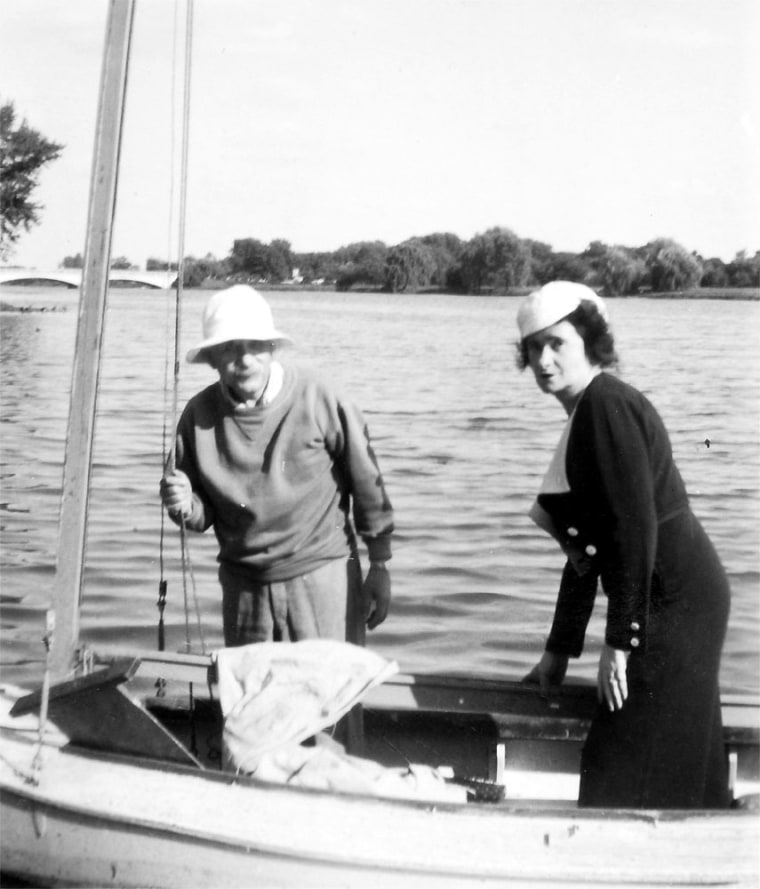In the last years of Albert Einstein’s life, he amused himself by telling jokes to his parrot, and avoided visitors by feigning illness, according to a newly discovered diary written by the woman known around Princeton as his last girlfriend.
While Einstein also talked about the travails of his continuing work in physics, most of Johanna Fantova’s diary recalls his views on world politics and his personal life.
The writings are “an unvarnished portrait of Einstein struggling bravely with the manifold inconveniences of sickness and old age,” Freeman Dyson, a mathematician at the Institute for Advanced Study in Princeton, told The New York Times in Saturday’s editions.
The 62-page diary, written in German, was discovered in February in Fantova’s personnel files at Princeton University’s Firestone Library, where she had worked as a curator. The manuscript is the subject of an article to be published next month in The Princeton University Library Journal.
Little written about science
According to the article, the new manuscript is the only one kept by someone close to Einstein in the final years of his life.
“There is surprisingly little about physics in the diary,” Donald Skemer, Firestone Library’s curator of manuscripts, told The Times of Trenton.
Fantova wrote that she recorded her time with the renowned physicist to “cast some additional light on our understanding of Einstein, not on the great man who became a legend in his lifetime, not on Einstein the renowned scientist, but on Einstein the humanitarian.”
Fantova was 22 years younger than Einstein. Although the two spent considerable time together starting in the 1940s, her journal only records their relationship from October 1953 until his death in April 1955 at age 76. She died in 1981 at age 80.
Princeton already had a collection of the poems, letters and photos Einstein sent to Fantova, who sold them after his death to Gillett G. Griffin, a retired curator at Princeton’s Art Museum. He gave those documents to the library.
Griffin, invited many times to Einstein’s home for dinner, said Fantova was a fixture there.
“Reading what she left gives me an immediate connection with my own experience and gives everyone the immediacy of knowing Einstein himself,” Griffin said.
The diary recounts Einstein speaking about the politics of the day and portrays him as critical of speeches of Adlai Stevenson, the nuclear arms race and the anti-communist attack on the scientist J. Robert Oppenheimer by Sen. Joseph McCarthy.
“This political persecution of his associate was a source of bitter disillusionment,” Fantova wrote.
Besides his politics, Fantova wrote of Einstein’s popularity and how he tried to write back to strangers, some of whom tried to convert him to Christianity. He said, “All the maniacs in the world write to me,” she wrote.
Lighter moments recounted
The diary also recounts how, on his 75th birthday, Einstein received a parrot as gift. After deciding the bird was depressed, Einstein tried alter its mood by telling bad jokes.
At times, Einstein would pretend to be sick in bed so he would not have to pose with visitors who wanted photographs. Einstein still enjoyed himself even when real illness did take hold.
“Einstein’s health began to fail, but he continued to indulge in what remained his favorite of all pastimes, sailing. Seldom did I see him so gay and in so light a mood as in this strangely primitive little boat,” Fantova wrote.
Einstein also wrote Fantova poems, some of which are in the diary.
Einstein, with his second wife Elsa, had arrived in Princeton in 1933 at the newly formed Institute for Advanced Study. Elsa died three years later.
Fantova first met Einstein in 1929 in Berlin. She arrived in the United States alone in 1939 and, at Einstein’s urging, attended library school at the University of North Carolina.
